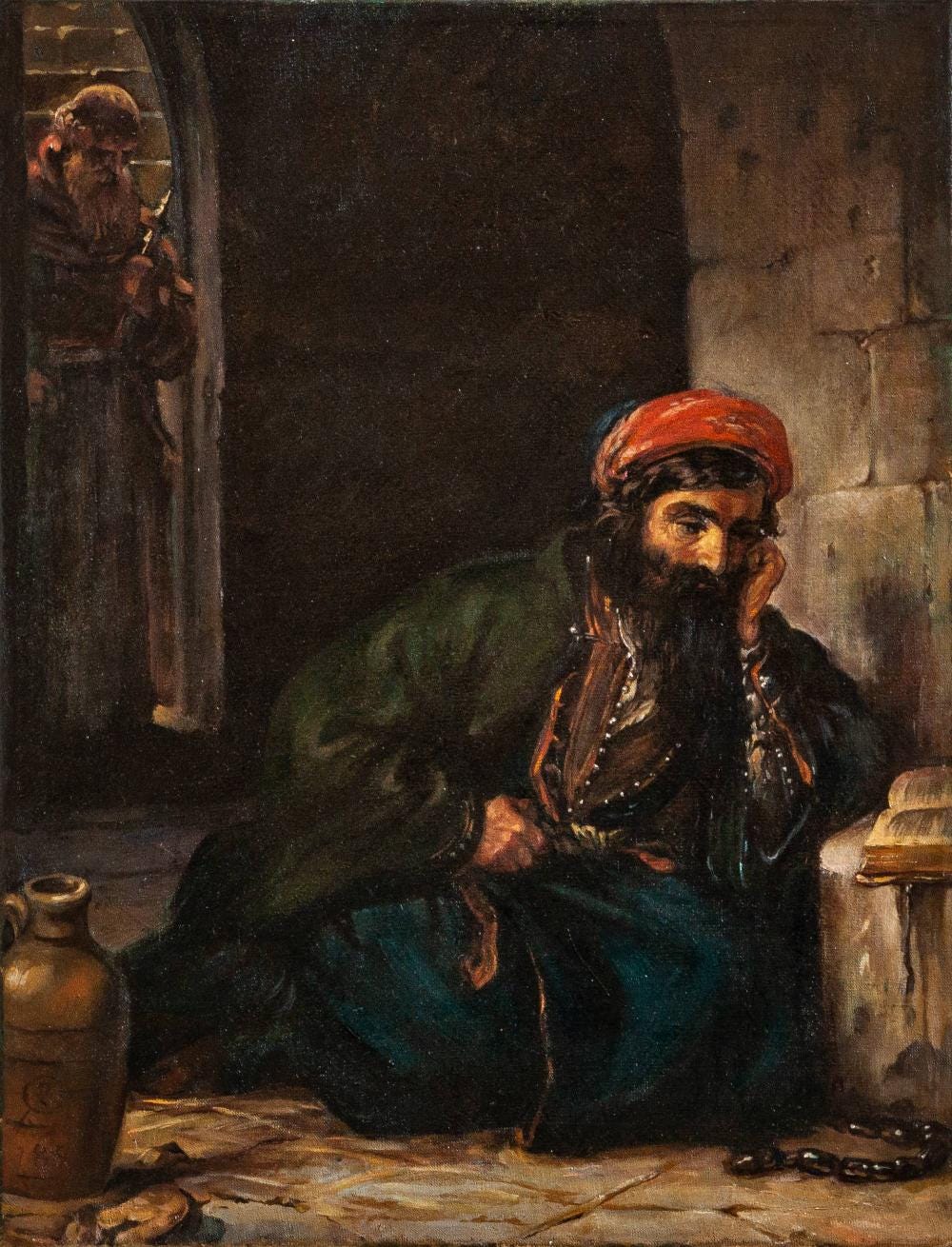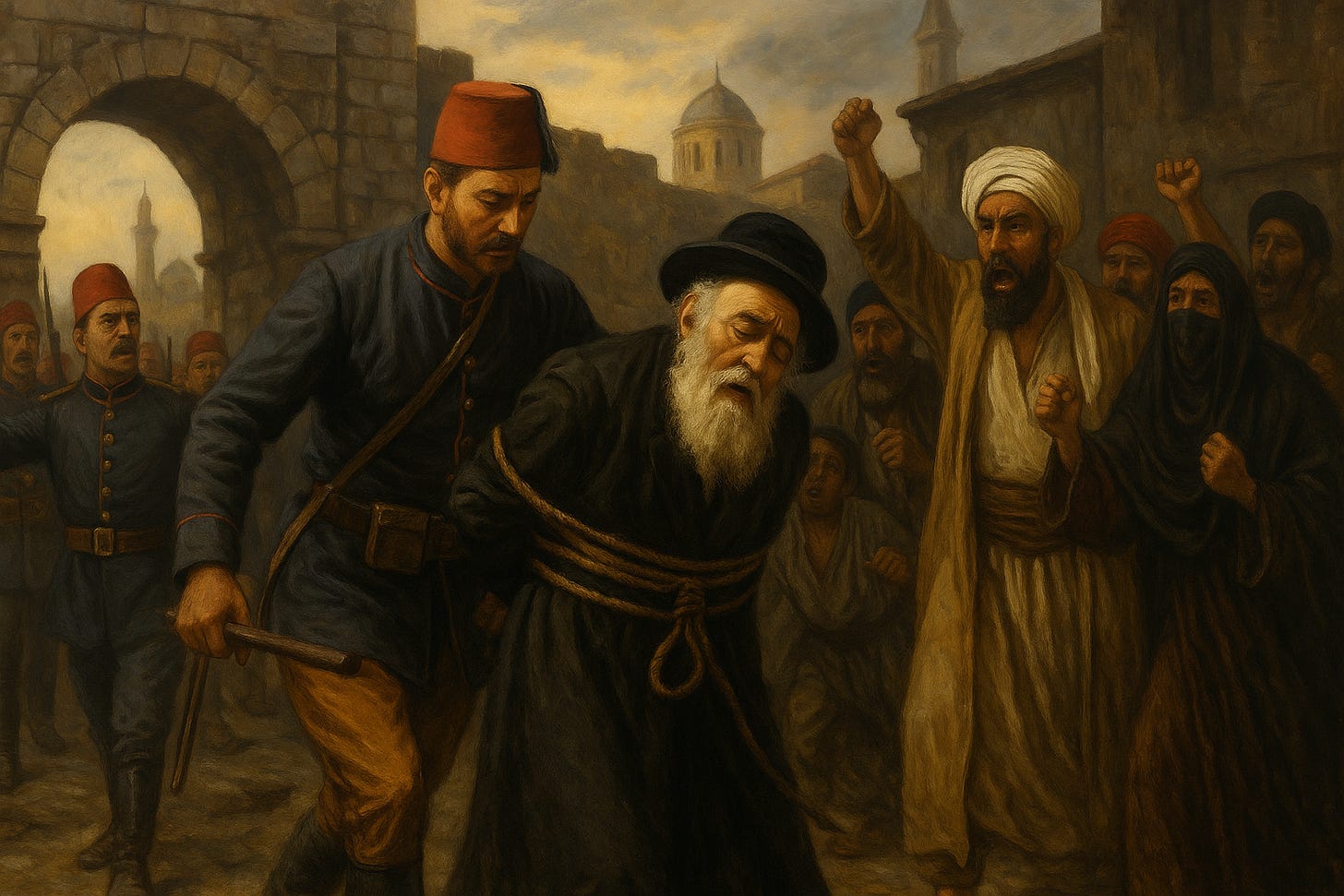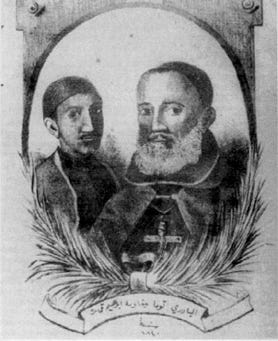Jews cannot afford to forget this historic blood libel.
The forgotten story of the Damascus Affair united Jews worldwide, and we must learn from it today.
Please consider supporting our mission to help everyone better understand and become smarter about the Jewish world. A gift of any amount helps keep our platform free of advertising and accessible to all.
This is a guest essay by Rabbi Menachem Levine, CEO of the largest Jewish school in the U.S. Midwest.
You can also listen to the podcast version of this essay on Apple Podcasts, YouTube Music, YouTube, and Spotify.
On February 5, 1840, Father Thomas, an Italian Friar of the Capuchin Order who lived in Damascus, disappeared with his Muslim servant Ibrahim Amara.
They were assumed murdered, possibly by businessmen with whom Thomas had had shady dealings or by a Muslim who was infuriated by an insult to Islam that Father Thomas had uttered.
But the Jews were to bear the blame as the Capuchin friars began spreading rumors that Jews had murdered the two men to use their blood for Passover. This led to one of history’s most famous blood libels, the Damascus Blood Libel, better known as the Damascus Affair of 1840.
Damascus was then under the rule of the Ottoman Empire. Since the Ottoman Empire was weak, the Ottoman governor of Egypt, Muhammad Ali Pasha, primarily ruled over both Egypt and Syria as quasi-independent principalities, with just nominal subordination to the Ottoman Empire. France also retained some measure of control in Syria, as the French had maintained a presence in the region since the time of the Crusades. The Catholics of Syria, including Father Thomas, were officially under French protection.
Due to the French jurisdiction over this case, the French consul, Ulysse de Ratti-Menton, known for his anti-Jewish views, presided over the investigation. Along with the governor-general, Sharif Pasha, he conducted a short investigation, and a barber named Shlomo Negrin, among others, was arbitrarily arrested and tortured.
They managed to extort a “confession” from Negrin that the monk had been killed in the house of David Harari by seven Jews. The men whom he named were arrested and tortured. Two of the detained men died, one converted to Islam to be spared, and the statements made under torture by the others were considered adequate as an admission of guilt.
Bones that were discovered in a sewer were “identified” as those of the monk and buried in a funeral on March 2nd, which increased the anger against the Jews. The inscription on the monk’s tombstone stated that this was the grave of a saint tortured by Jews. After the “funeral,” attacks began against Jews, and Sharif Pasha had to move hundreds of soldiers to protect the Jewish quarter.
The focus of the “investigation” was now on the servant, Ibrahim Amara. More torture extracted the “confession” that he had been murdered by Jews, among them members of the prominent Farhi and Picciotto families, and the authorities sought to arrest them. Knowing the torture that they would be subjected to, some of the accused tried to hide or escape. Rabbi Yaakov Antebi, accused of having received a bottle of the blood of Thomas, was arrested and tortured, yet he held strong under the torture and would not confess to anything.
More bones were found, and the investigators claimed they were the remains of Ibrahim Amara. However, the physician in Damascus, Dr. Lograso, did not believe they were human bones and, considering the pressure on him, requested that the bones be sent to Europe for examination. Ratti-Menton refused and instead announced that, based on the confessions of the accused and the remains found of the victims, the guilt of the Jews in the double murder was proven beyond a doubt.
One of the Jews who was arrested during the second round of accusations was Isaac Levi Picciotto, an Austrian citizen and thus under the protection of the Austrian consul. Initially, he was also subject to torture, but on March 8th, there was a sudden turnabout: The Austrian vice-consul, Caspar Giovanni Merlato, a personal friend of Picciotto, demanded that Picciotto be returned to Austrian jurisdiction and that the investigation be carried out at the Austrian consulate.
With Merlato’s involvement, things changed dramatically. Picciotto proved he was in a different place the evening of the murder, and a Christian corroborated this. Picciotto now moved from the defensive to the offensive and began accusing officials of instigating this blood libel, carrying out investigations under torture, and openly accusing Ratti-Menton of murder. He demanded that the Austrian authorities carry out the investigation. As torture methods were seen as unjust, cruel, and backward by Western countries, his accusations put Ratti-Menton and his aides on the defensive.
The predictable result of the accusations was that the Jews of Damascus and other parts of Syria began to suffer from antisemitic mobs. Synagogues were destroyed and looted, cemeteries were desecrated, and Jews were attacked all over the country.
News of the atrocities spread throughout the Jewish world, causing waves of shock and anger at what was going on in Syria.
The first Jewish attempt to intervene in the tragic situation came via a petition initiated by Israel Bak addressed to Muhammad Ali, the governor of Syria. At the same time, the Austrian Consul General in Egypt, Anton Laurin, received a report from the Austrian consul in Damascus. Recognizing the tremendous injustice, Laurin became very involved in the case by using his influence to petition Muhammad Ali to stop the torture methods used by the investigators.
Muhammad Ali agreed, and instructions were issued accordingly to Damascus by express courier. As a result, the use of torture came to an end on April 25, 1840, which caused a new round of riots in Damascus.
The accusation of murder and blood libel remained, and the investigation against the Jews continued, albeit without torture. Now, Austrian Consul General Laurin attempted to influence the French Consul General in Egypt to order his subordinate, Ratti-Menton, to stop the libel, but this effort was unsuccessful. At this point, Laurin went against all procedures and decided to send the information he received from Damascus to Baron James de Rothschild, the honorary Austrian consul in Paris.
Baron Rothschild appealed to the French government to stop the injustice, but when his appeals were ignored, he chose to turn to the media and publish the report in newspapers worldwide, creating public pressure to halt this travesty of justice.
His brother in Vienna, Solomon Rothschild, worked alongside him and used his influence to speak to Chancellor Klemens von Metternich about the situation. Metternich ultimately supported his consul, Laurin, since the negative publicity for France, archenemy of the Austro-Hungarian empire, was to his benefit. The British also chose to support the Jews in fighting the libel, and the British Consul General of England in Egypt expressed those policies.
As a result of the advocacy, a message was sent to Damascus on May 3, 1840, ordering protection for the Jews from the violence of Muslim and Christian mobs.

Western Jews in Europe and America were incensed at what was happening in Damascus. Europeans and American Jews lobbied their governments to intercede on behalf of the Jews in Damascus. In what was then an entirely novel approach, 15,000 Jews in six American cities gathered and protested on behalf of their fellow Jews in Syria.
Responding to the advocacy, government leaders condemned the libel and attempted to intervene on behalf of the accused Jews. Among them were Queen Victoria, Lord Henry Palmerston, U.S. Secretary of State John Forsyth and, as mentioned, Klemens von Metternich of Austria.
Primary among the Jews who were advocating on behalf of the Damascus Jews was Sir Moses Montefiore. He, along with French lawyer and future French Justice Minister Adolphe Cremieux, Louis Loewe, and Solomon Munk, traveled as a delegation to Egypt to appeal to Muhammad Ali. They requested that the investigation be transferred to Egyptian or European judges to consider the case. Their request was denied, but as a result, Muhammad Ali decided instead to have the Jews released without acquitting them. The liberation order was issued on August 28, 1840. The prisoners who had survived the investigation were freed.
Seeing that the charges would not be dropped and the libel would continue, Montefiore and Cremieux chose to turn to Sultan Abdul Mejid of the Ottoman Empire, since he was the actual leader over the region, albeit largely powerless. They asked the Sultan to issue a decree proclaiming blood libels as false and prohibiting prosecuting Jews based on such accusations. The Sultan acquiesced and issued his ruling on November 6, 1840. In a noteworthy act, he condemned the blood libel, stating clearly that it was utterly false and that:
“Muslim theologians had examined Jewish religious books and found that the Jews are strongly prohibited not only from using human blood but even from consuming that of animals. It therefore follows that the charges made against them, and their religion, are nothing but pure calumny.”
Nevertheless, for years to come, and on antisemitic websites until today, the Catholics of Damascus would continue to tell the story of the friar murdered by Jews for his blood and that the Jews had only been let free due to the influence of powerful Jews from other countries.
In the aftermath of the Damascus Affair, numerous questions arose. How could France, a country that gave civil equality to the Jews in 1791 and its Jewish population the most legal rights, openly support the patently false blood libel accusation and even allow torture to be used to extort confessions?
Most historians conclude that the answer was national self-interest. France’s leaders saw it as beneficial to maintain their foothold in Syria and felt that supporting the accusers against the Jews would work for them. By the same token, countries hostile to France seized the opportunity to denounce France for its actions, as they sought to increase their control in the Middle East and diminish French influence there.
So, Metternich, not known to be a friend of the Jews, denounced the blood libel charges, as did the leaders of Great Britain. The Damascus Blood Libel, which might otherwise have passed unnoticed in Europe, garnered international attention because of the rivalry of Europe’s great powers in the Middle East.
The Damascus Affair has been described as a turning point in modern Jewish history, particularly for French Jews, who were among the most vocal supporters that traditional Jewish nationalism was a thing of the past. They were patriotic citizens for whom religion was a private matter if it was relevant at all.
Yet, when they were exposed to the antisemitism that France displayed in the Damascus Affair, French Jews were completely shaken up. In fact, all of world Jewry was shocked that the blood libel accusation — a throwback to the antisemitism of the Dark Ages — was initially accepted as fact by almost the entire press in Europe. How could it be that educated citizens and modern leaders believed and supported this baseless and ridiculous accusation? No reassuring answer was forthcoming.
In an act that would reverberate for the next two centuries, in 1846, a two-volume book was published in Paris, written by Achille Laurent (a pseudonym), “Relation historique des affaires de Syrie depuis 1840 jusqu’en 1842.” It claimed to document the complete protocols of the investigation in Damascus, yet completely omitted any mention of the extensive use of torture and only focused on Jews as murderers, and that the blood libel was a proven fact.
These protocols were published in German, Italian, Arabic, and Russian in the years and decades to come. This book allowed antisemites to “prove” that the murder accusation had been proven and documented, but that the Jews were released despite their guilt. In fact, Russian coverage of the Damascus Affair in the media is seen as one of the causes that led to the pogroms of the 1890s. Unfortunately, these protocols continue to be published and publicized, particularly in Arabic-language media.
One of the end results of the Damascus Affair was its awakening of Jewish awareness for the need to cooperate to address Jewish needs and respond to charges and attacks towards Jews around the world. In the following decades, for the first time in modern history, multiple such organizations would form to address these concerns.
The subsequent blood libel that made international news was that of Menachem Mendel Beilis in Russia in 1911. The lawyer who headed the defense team, the legendary Oscar Gruzenberg, was sure that the prosecution’s attack would take quotes out of context from the Talmud and use them to accuse the Jews.
He had Rabbi Mazeh, Chief Rabbi of Moscow, head a rabbinic advisory team for the defense and prepare answers to the inevitable questions. As Gruzenberg had predicted, at the trial the prosecution quoted the Talmudic statement in Tractate Yevamos 61a: “You (the Jewish People) are called ‘Adam’ (Man), and the other nations are not called ‘Adam’ (Man).”
The prosecutors demanded, “How could the Jews claim only they are called man, and the other nations are not called man?! It must mean that they view non-Jews as subhuman!”
The defense had an answer prepared, provided by Rabbi Meir Shapiro, who was already renowned as a brilliant and eloquent leader of Polish Jewry. He explained that the quote reflects an essential characteristic of the Jews and was not intended an insult to the other nations.
Rabbi Shapiro explained that the Talmud teaches that “Kol Yisrael areivim zeh lazeh,” meaning all Jews are responsible for one another. He elaborated that in the court, the fate of a single Jew (Mendel Beilis) was being decided, yet the judgment touched Jewish people all over the world.
Rabbi Shapiro directed the defense team to ask the judge:
“If an Italian citizen was arrested in Poland or a Frenchman in Germany, would all of Italy or all of France be praying on his behalf and advocating for his acquittal? Would Italians or Frenchmen all over the world be constantly worried about him and awaiting news of his release?”
“Of course not.”
“Yet, when one Jew in Russia is falsely accused of murder, the entire Jewish nation stands with him, because we are truly one. The Talmud says Jews are called ‘Adam,’ because ‘Adam’ shows the unity of the Jewish nation. We are one, a single unit, just as Adam was one man. The word ‘Adam’ in Hebrew has no plural, and that is why it represents the Jewish People, who are one, and this pronoun is not used to identify other nations, as the Talmud stated.”
The Damascus Affair of 1840 teaches lessons that feel eerily relevant in our post–October 7th world. Then, as now, a grotesque lie — one too absurd to be believed by rational minds — was embraced and amplified because it served political, religious, or ideological interests.
In Damascus, Jews were accused of ritual murder despite no credible evidence; today, Israel and the Jewish People are falsely branded as genocidal aggressors, even as we face unprecedented violence, especially violence that is justified by Jew-haters in the name of us being “genocidal aggressors. “The common thread is the dangerous power of propaganda: When a narrative fits a pre-existing bias, truth becomes irrelevant.
Another lesson is the necessity of global Jewish unity. The Damascus Affair marked one of the first moments in modern history when Jews across continents rallied together, petitioned governments, and spoke with one voice. That same spirit is required now. After October 7th, Jews worldwide are reminded that our fates are bound together; silence or division only emboldens those who wish us harm. Collective advocacy, grounded in facts and moral clarity, can still sway hearts, governments, and public opinion — even in the face of relentless hostility.
Finally, the Affair is a reminder that antisemitism mutates but never disappears. In the 19th century, the blood libel masqueraded as justice and piety. Today, the same ancient hatred hides behind the misleading language of “human rights” and “decolonization.”
To confront this, the Jewish People must not only defend against lies, but also tell a more compelling story of who we are, what we stand for, and the great values we embody. The Damascus Affair calls us to vigilance, unity, and courage — qualities we cannot afford to abandon in a world that has shown, yet again, how quickly reason can be drowned out by rage.





https://www.algemeiner.com/2025/11/27/the-dangerous-legacy-of-the-1840-damascus-affair-blood-libel-part-one/
https://www.algemeiner.com/2025/11/28/the-dangerous-legacy-of-the-1840-damascus-affair-blood-libel-part-two/
UCL and The Damascus Affair
We respond to Dr Maqusi's blood libel with the facts about the Damascus Affair
https://danielclarkeserret.substack.com/p/ucl-and-the-damascus-affair